牛津版高二英语省略句
- 格式:pdf
- 大小:917.80 KB
- 文档页数:8

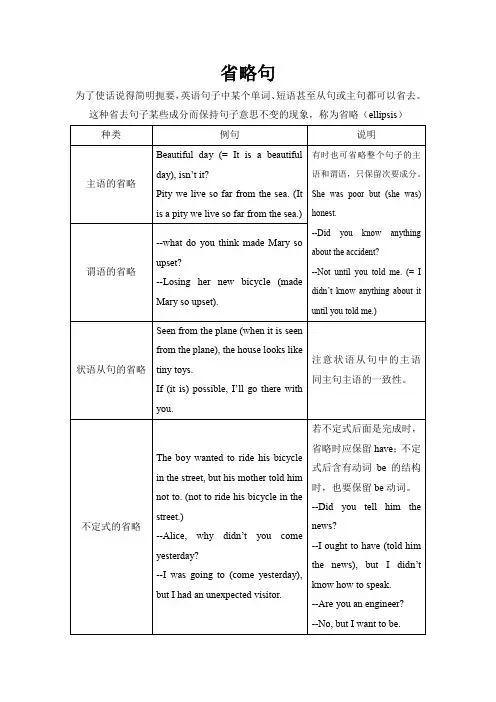
省略句为了使话说得简明扼要,英语句子中某个单词、短语甚至从句或主句都可以省去。
这种省去句子某些成分而保持句子意思不变的现象,称为省略(ellipsis)Ⅰ、状语从句中的省略用法一、如果从句的主语和主句的主语一致,且从句的谓语含有be动词的某种形式(am/is/are/was/were),可同时省略从句的主语和be动词的某种形式。
1、when,while引导的时间状语从句e.g. Do be careful when (you are) crossing the street.When/While (I was) on my way to work, I met her.2、if,unless,once引导的条件状语从句e.g. If (it is) properly treated, waste will do no harm to the environment.I’ll not go to the party unless (I am) invited.Once (you are) caught stealing in a supermarket, you will be punished.3、though,although,whether,no matter whether/what/how/who等引导的让步状语从句e.g. He was happy, though/although (he was) poor.Whether (she is) sick or well, she is always cheerful.No matter how/However hard the task (is), we must fulfill it in time.(注:从句的主语和主句的主语不一致时,只省略从句中的be动词形式)4、as if,as though引导的方式状语从句e.g. He rubbed his eyes and yawned as if/though (he was) waking up after along sleep.He stood up as if/though (he wanted) to leave.(as if/though + to do表示一个将来的动作)二、than,as引导的比较状语从句中的省略用法:当不同的主语进行比较时,一般省略从句中的谓语;当从句中的主语与谓语(be动词除外)和主句中的主语与谓语相同时,通常省略从句中的主语和谓语,只保留比较部分。
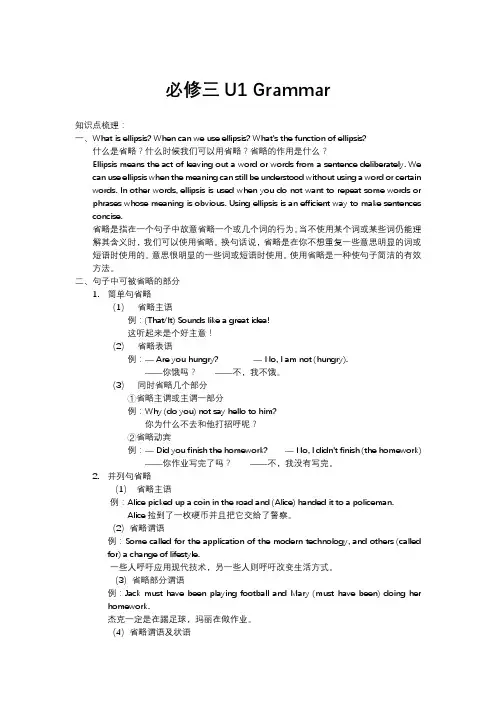
必修三U1 Grammar知识点梳理:一、What is ellipsis? When can we use ellipsis? What's the function of ellipsis?什么是省略?什么时候我们可以用省略?省略的作用是什么?Ellipsis means the act of leaving out a word or words from a sentence deliberately. We can use ellipsis when the meaning can still be understood without using a word or certain words. In other words, ellipsis is used when you do not want to repeat some words or phrases whose meaning is obvious. Using ellipsis is an efficient way to make sentences concise.省略是指在一个句子中故意省略一个或几个词的行为。
当不使用某个词或某些词仍能理解其含义时,我们可以使用省略。
换句话说,省略是在你不想重复一些意思明显的词或短语时使用的。
意思很明显的一些词或短语时使用。
使用省略是一种使句子简洁的有效方法。
二、句子中可被省略的部分1.简单句省略(1)省略主语例:(That/It) Sounds like a great idea!这听起来是个好主意!(2)省略表语例:— Are you hungry? — No, I am not (hungry).——你饿吗?——不,我不饿。
(3)同时省略几个部分①省略主谓或主谓一部分例:Why (do you) not say hello to him?你为什么不去和他打招呼呢?②省略动宾例:— Did you finish the homework? — No, I didn't finish (the homework) ——你作业写完了吗?——不,我没有写完。
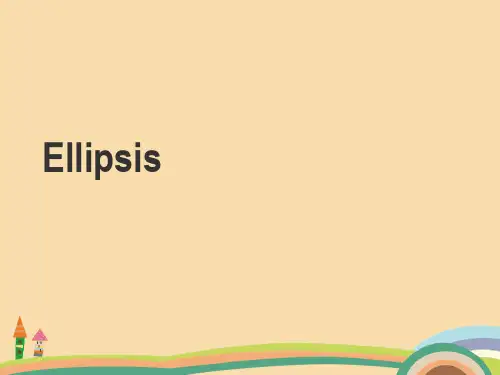
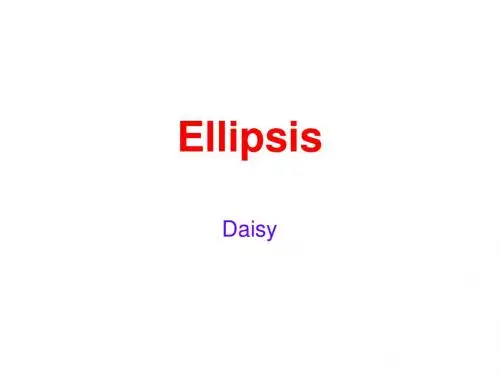
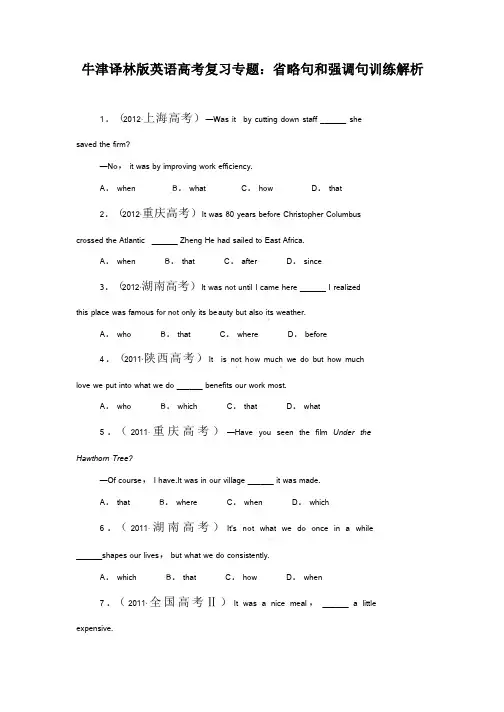
牛津译林版英语高考复习专题:省略句和强调句训练解析1.(2012·上海高考)—Was it by cutting down staff ______ shesaved the firm?—No,it was by improving work efficiency.A.when B.what C.how D.that2.(2012·重庆高考)It was 80 years before Christopher Columbuscrossed the Atlantic ______ Zheng He had sailed to East Africa.A.when B.that C.after D.since3.(2012·湖南高考)It was not until I came here ______ I realizedthis place was famous for not only its be a uty but also its weather.A.who B.that C.where D.before4.(2011·陕西高考)It is not how much we do but how muchlove we put into what we do ______ benefits our work most.A.who B.which C.that D.what5 .(2011·重庆高考)—Have you seen the film Under the Hawthorn Tree?—Of course,I have.It was in our village ______ it was made.A.that B.where C.when D.which6 .(2011·湖南高考)It's not what we do once in a while______shapes our lives,but what we do consistently.A.which B.that C.how D.when7 .(2011·全国高考Ⅱ)It was a nice meal ,______ a little expensive.A.though B.whether C.as D.since8.(2011·江苏高考)It sounds like something is wrong with the car's engine.______,we'd better take it to the garage immediately.A.Otherwise B.If notC.But for that D.If so9.(2013·河北保定八校联考)You ought to have thought of that,but you ______.A.haven't B.didn't C.don't D.can't10.(2013 成都高新区统一测试)—I saw your uncle take a taxi to the airport.Why didn't you drive him there?—I ______.But my car ______.A.would;was fixed B.would have;was fixedC.would have;was being fixed D.did;was being fixed11.—Have you been to the Great Wal l?—Perhaps not in my memory.______,it might have been duringmy early childhood.A.If any B.If ever C.If not D.If possible12 .(2013·辽宁鞍山模拟)In summer ,food will go bad if ______ in room temperature.A.leaving B.leftC.being left D.having left13 .(2013·北京朝阳期中)—He didn't feel a bit nervous when______.—No.He'd spent a lot of time preparing for it after all.A.interviewing B.interviewedC.having interviewed D.to be interviewed14.(2013·福建三明期中)—______ you write so well?—By reading and keeping diaries every day.A.How is it B.What is itC.How is it that D.What is it that15.(2013·山西山大附中期中)—Will you go to see the movie A Simple Noodle Story tomorrow evening?—No,I am going to a lecture,or at least I am planning ______.A.to B.so C.go D.that16.(2013·甘肃天水模拟)Can you tell me ______ it was ______ your brother's cell phone was lost?A.where;that B.which;thatC.that;where D.where;which17.(2013·河北邯郸质检)—Have you got any particular plan s for the coming holiday?—Yes,______,I'm going to visit an old friend in the city.A.If ever B.If busyC.If anything D.If possible18.(2013·四川成都外国语学校月考)Having an outdoor meal is always fun,but it can also be damaging to the planet if ______.A.planned not carefully B.not planning carefullyC.not planned carefully D.not to be planned carefully19.Why was ______ that the old woman was sent to prison?A.he B.it C.that D.what20.(2013·江西师大附中英语月考)Mr Green didn't understand ______made his daughter so absent-minded this morning.A.how that was B.what was itC.why it was that D.what it was that21.(201 3·云南玉溪一中英语月考)I would have paid a visit to you ______ possible.A.if it were B.would it beC.had it been D.should it have been参考答案1.D从句意的连贯看,本空所在问句是强调句的一般疑问句,陈述句的表达是It was by cutting down staff that she saved the firm.(她通过裁减员工挽救了公司)因此本空选D 项。
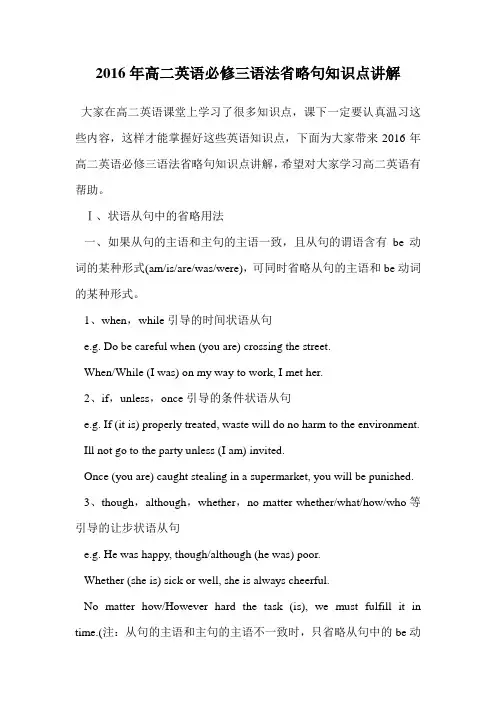
2016年高二英语必修三语法省略句知识点讲解大家在高二英语课堂上学习了很多知识点,课下一定要认真温习这些内容,这样才能掌握好这些英语知识点,下面为大家带来2016年高二英语必修三语法省略句知识点讲解,希望对大家学习高二英语有帮助。
Ⅰ、状语从句中的省略用法一、如果从句的主语和主句的主语一致,且从句的谓语含有be动词的某种形式(am/is/are/was/were),可同时省略从句的主语和be动词的某种形式。
1、when,while引导的时间状语从句e.g. Do be careful when (you are) crossing the street.When/While (I was) on my way to work, I met her.2、if,unless,once引导的条件状语从句e.g. If (it is) properly treated, waste will do no harm to the environment. Ill not go to the party unless (I am) invited.Once (you are) caught stealing in a supermarket, you will be punished.3、though,although,whether,no matter whether/what/how/who等引导的让步状语从句e.g. He was happy, though/although (he was) poor.Whether (she is) sick or well, she is always cheerful.No matter how/However hard the task (is), we must fulfill it in time.(注:从句的主语和主句的主语不一致时,只省略从句中的be动词形式)4、as if,as though引导的方式状语从句e.g. He rubbed his eyes and yawned as if/though (he was) waking up after a long sleep.He stood up as if/though (he wanted) to leave.(as if/though + to do表示一个将来的动作)二、than,as引导的比较状语从句中的省略用法:当不同的主语进行比较时,一般省略从句中的谓语;当从句中的主语与谓语(be动词除外)和主句中的主语与谓语相同时,通常省略从句中的主语和谓语,只保留比较部分。
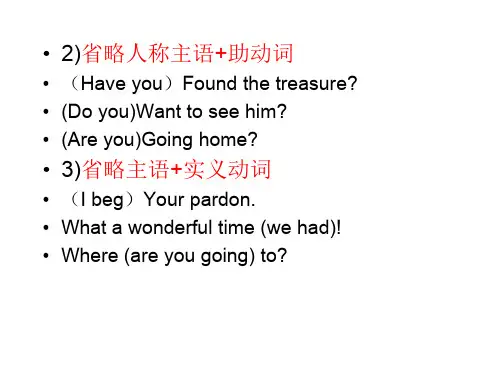
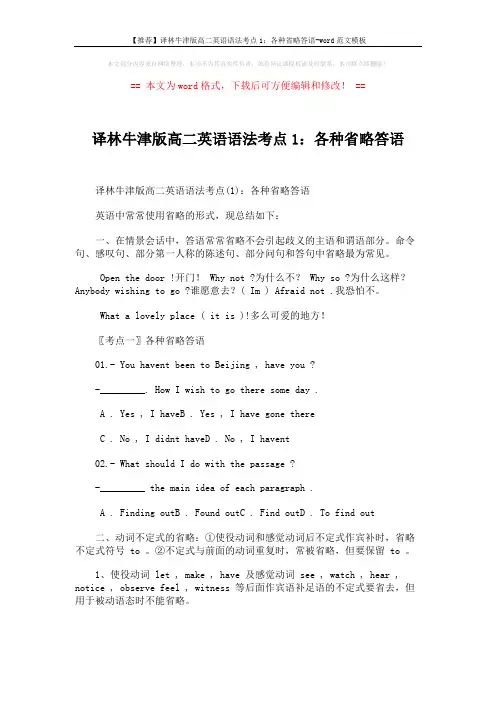
【推荐】译林牛津版高二英语语法考点1:各种省略答语-word范文模板本文部分内容来自网络整理,本司不为其真实性负责,如有异议或侵权请及时联系,本司将立即删除!== 本文为word格式,下载后可方便编辑和修改! ==译林牛津版高二英语语法考点1:各种省略答语译林牛津版高二英语语法考点(1):各种省略答语英语中常常使用省略的形式,现总结如下:一、在情景会话中,答语常常省略不会引起歧义的主语和谓语部分。
命令句、感叹句、部分第一人称的陈述句、部分问句和答句中省略最为常见。
Open the door !开门! Why not ?为什么不? Why so ?为什么这样?Anybody wishing to go ?谁愿意去?( Im ) Afraid not .我恐怕不。
What a lovely place ( it is )!多么可爱的地方!〖考点一〗各种省略答语01.- You havent been to Beijing , have you ?-_________. How I wish to go there some day .A . Yes , I haveB . Yes , I have gone thereC . No , I didnt haveD . No , I havent02.- What should I do with the passage ?-_________ the main idea of each paragraph .A . Finding outB . Found outC . Find outD . To find out二、动词不定式的省略:①使役动词和感觉动词后不定式作宾补时,省略不定式符号 to 。
②不定式与前面的动词重复时,常被省略,但要保留 to 。
1、使役动词 let , make , have 及感觉动词 see , watch , hear , notice , observe feel , witness 等后面作宾语补足语的不定式要省去,但用于被动语态时不能省略。
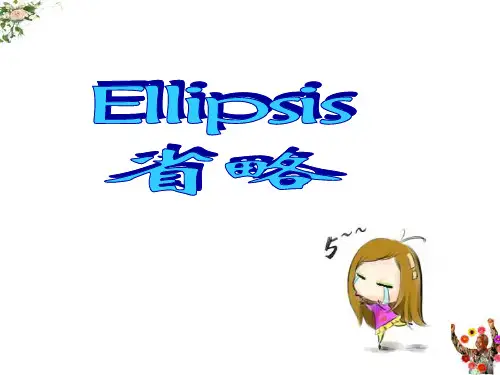
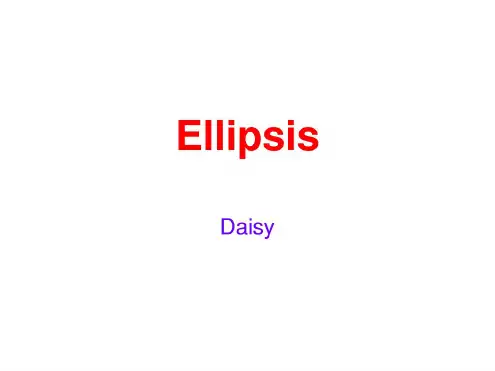
语法专练:简单句、省略句、倒装句【考点透视】高考试题每年都要涉与这些特殊的句型结构,每年单项填空题都会出现1—2道。
高考试题对这些句型结构的考查往往是以测试它们中的特殊结构为主,例如在并列句、复合句以与否认副词中反意疑问句的构成;倒装句中否认副词位于句首时的用法;as引导让步状语从句的倒装;省略if的虚拟条件句等。
又如强调句中的强调特殊疑问句以与强调句与其他相似句式的混合使用等。
估计今后高考试题不会降低对这些特殊句型结构的考查力度。
一简单句只有一个主语〔或并列主语〕和一个谓语〔并列谓语〕的句子叫作简单句。
根据句子的结构,简单句可分为5种:①主语+不与物动词;②主语+ 系动词+表语;③主语+与物动词+宾语;④主语+与物动词+间接宾语+直接宾语;⑤主语+与物动词+宾语+宾语补足语。
根据句子的功能,简单句可分为4类:①陈述句;②疑问句;③祈使句;④感叹句。
〔一〕陈述句〔二〕祈使句〔三〕感叹句〔四〕疑问句1.一般疑问句2.特殊疑问句3.选择疑问句4.反意疑问句:前局部陈述,后局部提问。
〔1〕前局部陈述句的谓语是be,have或情态动词,附加局部为“be / have / 情态动词+主语?〞〔2〕前句的谓语是行为动词,附加局部为“do +主语?〞〔3〕前句的谓语是there be,附加局部为“be +there?〞〔4〕前句的谓语是used to,附加局部为“didn’t / usedn’t +主语?〞〔5〕前句的谓语是ought to,附加局部为“oughtn’t +主语?〞〔6〕含有情态动词must的句子表示推测,附加局部要根据must后面的不定式结构的时态来确定,不可用mustn’t。
假设对现在情况的推测,附加局部用aren’t/ isn’t + 主语。
He must have met him yesterday, didn’t he? (一般都有过去时间状语)He must have seen the film, haven’t you?〔7〕前句的谓语局部出现否认词缀,附加局部仍用否认结构。
语法讲解:省略与替代(一)并列句中的省略在并列句中,第二分句(或第三、第四分句)往往可以省略与前句相同的成分。
如:Some books are to be tasted, others (are) to be swallowed, and some few (are) to be chewed and digested.(二)简单句中的省略1.省略主语1)祈使句中的主语通常被省略。
如:(You) Be seated, please.2)其他省略主语多限于少数现成的说法。
如:(I)Thank you for your help. (谢谢你的帮助。
)(It)Doesn’t matter. (没关系。
)2.省略主谓语或主谓语的一部分。
如:(There is) No smoking. (禁止吸烟。
)(Is there) Anything else? (还有其他事吗?)(You come) This way, please. (请这边走)。
(Will you)Have a smoke? (吸支烟?)What (do you) think about a cup of tea? (来一杯怎么样?)Why(do you)not say hello to him ?(为什么不和他说声再见呢?)3.省略宾语。
如:—Do you know Miss Gao? (你认识高小姐吗?)—I don’t know(her). (我不认识。
)—Which of them is the better choice? (他们中谁是更合适的人选?)—Well, it’s hard to tell(it). (哟,这很难说。
)4.省略表语。
如:—Are you thirsty? (你渴吗?)—Yes, I am(thirsty). (是的,我渴。
)5.同时省略几个成分。
如:—Are you feeling better now? (你觉得好些吗?)—(I am feeling)Much better(now). (好多了。